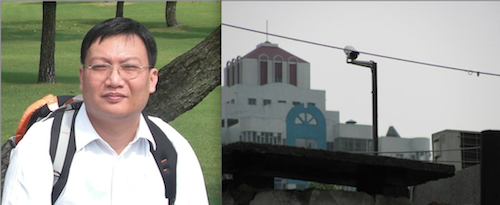Out of Sight, Out of Rage
by Tienchi Martin-Liao / July 4, 2012 / No comments
How the State monitors its citizens

Left: Essayist Ye Du. Right: One of the three cameras that monitor Ye Du's apartment. Photos from ChinesePen.org.
Ye Du, essayist, blogger, and webmaster, is in a rage. After his morning shower, he stands in front of the bathroom window. There it is! Even when the “big eye” is already a part of his daily life, blood rushes to his head every time he sees it—especially when he gets out of the shower. Ye Du stretches out his left hand and aims with two fingers at the “eye.” “Bang!” he shouts. Unimpressed, the camera installed outside his window shines under southern China’s scorching sun.

- During the Cultural Revolution, people were sentenced to death or outright murdered because of one wrong sentence. In China today writers do not lose their lives over their poems or articles; however, they are jailed for years. My friend Liu Xiaobo for example will stay in prison till 2020; even winning the Nobel Peace Prize could not help him. In prison those lucky enough not to be sentenced to hard labor play “blind chess” to kill time AND TO TRAIN THE BRAIN NOT TO RUST. Freedom of expression is still a luxury in China. The firewall is everywhere, yet words can fly above it and so can our thoughts. My column, like the blind chess played by prisoners, is an exercise to keep our brains from rusting and the situation in China from indifference.

- Tienchi Martin-Liao is the president of the Independent Chinese PEN Center. Previously she worked at the Institute for Asian Affairs in Hamburg, Germany, and lectured at the Ruhr-University Bochum from 1985 to 1991. She became head of the Richard-Wilhelm Research Center for Translation in 1991 until she took a job in 2001 as director of the Laogai Research Foundation (LRF) to work on human rights issues. She was at LRF until 2009. Martin-Liao has served as deputy director of the affiliated China Information Center and was responsible for updating the Laogai Handbook and working on the Black Series, autobiographies of Chinese political prisoners and other human rights books. She was elected president of the Independent Chinese PEN Center in October 2009 and has daily contact with online journalists in China.
Ye Du sighs. He has seen the German movie Das Leben der Anderen (The Lives of Others). But when the Stasi monitored their victims, at least they went undercover and hid themselves like shadows. In China, the lackeys do their jobs with psychological toughness. They want their targets to feel like chicks that could be snatched up by the eagle at any moment. According to the respected, but constantly trembling under party pressure, newspaper Southern Metropolis Daily, this year’s budget for “stability maintenance” (officially, the budget for public security) is over 700 billion RMB [$110 billion US]. This number is even higher than the state’s defense budget of 670 billion RMB [$105 billion US]. Now we know why. The surveillance of Ye Du costs the state tens of thousands of RMB a month, a sum ten times higher than his own income.
Ye Du is not alone. There are hundreds of thousands of citizens being monitored in China: Writers, journalists, lawyers, relocated urban inhabitants, peasant workers, petitioners, underground church members, Falungong, and others. Although equipped with modern technology, the police are stressed out. So they have hired an army of bums to help. The blind civil rights defender Chen Guangcheng was encircled by over 60 police and abettors before he successfully fled his house. When a government treats its citizens as enemies and criminals, governing becomes a very expensive game.
Because of his position as webmaster for the Independent Chinese PEN Center and his social connections with other writers, Ye Du was arrested and detained for three months last spring when the Jasmine Revolution broke out in the Arabic world. At the time the authority was nervous that the revolutionary fire could reach the darkness on the Mainland, so some potential troublemakers were arrested and detained in unknown places. Months later, when all the “potential threats” had been nipped in the bud and the irrepressible voices muffled, Ye Du and the others were released. However, after Ye Du’s release a booth was set up in front of his house. In this booth sat a guard that he had to check in with twice a day. Now the guard has withdrawn, but cameras have taken over the surveillance instead.
There are three cameras installed around Ye Du’s apartment: One opposite his bathroom, and two on the balcony opposite his bedroom. Ye Du posts pictures of the cameras with comments on his blog: “Maybe they are tired of the love show from my wife and me, so they turn the front camera inward temporarily, but the one on the wall is still working. ”
Out of sight, out of rage. Ye Du’s wife plans to sew some curtains for the windows, but he knows it can only protect their privacy for a limited time. Soon they will have to face the choice: Either take down the curtains or experience another home raid. “I’d rather they be able to see my butt than be raided again,” Ye Du said with a bitter smile.




